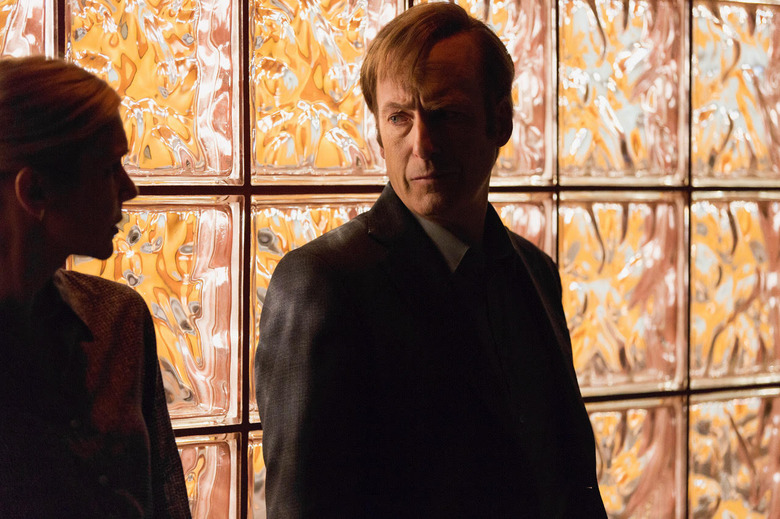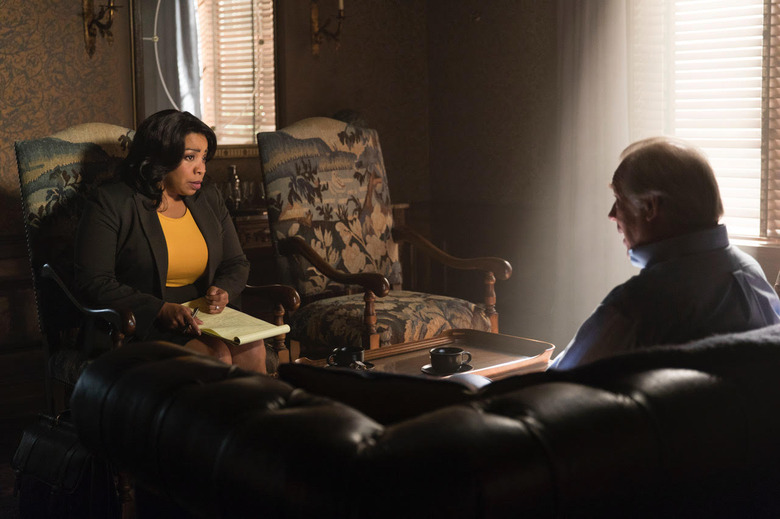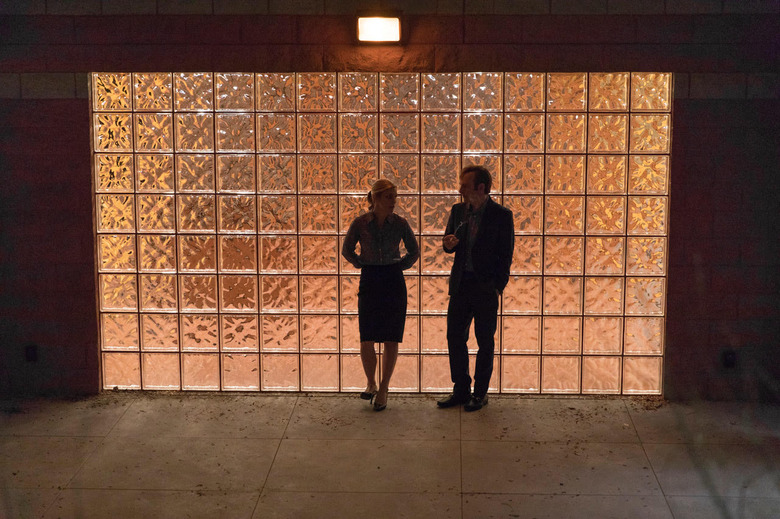'Better Call Saul' Review: Who Came Out On Top In 'Sunk Costs'?
(Every week, we're going to kick off discussion about Better Call Saul season 3 by answering one simple question: who came out on top when the credits rolled?)
The title of this week's Better Call Saul, "Sunk Costs," refers to a cost that's been paid and can't be recovered, i.e. it refers to irreparable damage. A lot has happened over the course of the last two seasons, but the ground lost has always seemed like it could be regained. But something's snapped, now. We've past the point of no return on the path from Jimmy to Saul, and the pall it casts over the show is palpable, not to mention painful.
On Top This Week: Mike
Better Call Saul has an uncanny sense of time. It plays relatively loosely with it while at the same time refusing to let even a single second pass unaccounted. So far this season, each episode has picked up almost exactly where the last left off. The last episode ended with Mike (Jonathan Banks) finding a cell phone in the middle of the road; the episode — following a cold open, which we'll get to in a bit — begins just as Mike picks up. On the other end of the line is none other than Gus Fring (Giancarlo Esposito). The man himself arrives just a few moments later, and Mike and Gus get down to brass tacks. Gus wants Hector Salamanca (Mark Margolis) out of the picture, but not dead. And Mike's not quite done with Hector, not after the fallout caused by his last brush with the cartel boss. So they reach a compromise: Gus provides the metaphorical wrench in the form of cocaine, and Mike throws it by stringing it up in a pair of red sneakers above Hector's exportation route, sniping it when the car passes so the residue gets the truck stopped at border patrol.
The episode's cold open teases at the passage of time. We see those same sneakers, but they've faded in color to look blood-stained rather than bright red, and the truck passing underneath has the Los Pollos Hermanos logo emblazoned on it, rather than Hector's Regalo Helado branding. It's another reminder that we know where everyone ends up — Mike becomes Gus' right-hand man, Gus becomes top dog, Hector ends up mute and in a wheelchair — but we still don't know how they'll all get there.
The Fallacy of Sunk Costs
There's a real heartbreak that suffuses the entire third episode. It's all anchored on Bob Odenkirk's performance as Jimmy. Most of the time, the timbre of his voice runs the gamut as he speaks. He's animated, he's loud, he's bright. But here, that buoyancy is gone, and it's alarming to hear his voice so bare. Chuck (Michael McKean) tells Jimmy that his current predicament is for his own good (more, it seems, for Chuck to convince himself that he's not doing it out of ego and selfishness than to convince Jimmy of it), and Jimmy's response is shocking in how blunt it is. "Here's what's gonna happen," he says. "One day you're gonna get sick again. One of your employees is gonna find you curled up in that space blanket, take you to the hospital, hook you up to those machines that beep, and whir, and hurt. And this time, it'll be too much. And you will die there. Alone." Jimmy has always cared more for Chuck than Chuck has cared for him, but the cost that's been incurred is finally too high. The damage is irreparable.
The moment is scored to silence, and the musical cue that follows ("Hurry Sundown") is all the more striking as a result, as Jimmy is taken to jail to be processed. The show balances the more flamboyant and comedic aspects we know are to come as a part of the Saul Goodman persona with the abject misery of the path that it's taking to get there, and there's no easier way to track that journey than through the show's use of sound. Heartbreak cedes to theatricality, if only to cover up the wounds that remain.
Family Matters
Chuck is the closest thing that the show has to an antagonist, though it isn't so much out of the typical malicious intent that you'd assign to a villain as it is coming to loggerheads with a whole mess of inherently human faults and foibles. When he meets with the prosecutor for Jimmy's case (played by Kimberly Hebert Gregory, last seen in Vice Principals), he says, "You know, Jimmy has a good heart." For one second, we think he might genuinely believe that. But once again, that seeming good is for himself rather than for his brother, as he sets into motion a deal that would keep Jimmy from serving any time but result in his disbarment.
It's difficult, too, to keep being kind in looking upon Chuck when his victory over his brother has him feeling so good about himself that he goes out to speak to Jimmy on his lawn without even bringing a space blanket along with him. Chuck only remains sympathetic by virtue of Michael McKean's acting. As he tells Jimmy that he's doing it for him, his expression goes from smug to saccharine to desperate, and when Jimmy tells him how he'll die, the look on his face is first of hurt. And then, simply, it's shock, a mix of fear and of loneliness. Anger is easy for the McGill brothers; it's vulnerability that's hard.
Going It Alone
Jimmy's starting to realize that the trouble he stumbles into has repercussions for everyone around him, and his number one concern when it comes to collateral damage is Kim (Rhea Seehorn). Where Chuck is selfish in causing trouble and saying it's for Jimmy's good, Jimmy's done something similar when it comes to Kim. He's caused bigger and bigger ripples in the pond because he cares about her. The difference between the two brothers is that Jimmy can see it. He tries to keep Kim from getting involved in the case but he knows (and she knows) that he needs her help if he wants to make it out alive. And she cares about him too much to let him drown.
The final scene, in which the two of them finally agree to team up, is gorgeously shot, heavy in dark shadows and golden light. It feels like a respite before a storm that we know is coming; we don't know how Jimmy's story ends, but we know that Kim doesn't figure into Saul Goodman's life.



